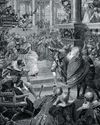
Britten is widely celebrated for his profound connection with Suffolk’s flat, open landscapes, its coast and its rich birdlife of waders and waterfowl, one of which is celebrated in his opera (or ‘Church Parable’) Curlew River. It’s a curious paradox, then, that much of his music, even some that is most apparently rooted in that East Anglian region – including in his great ‘home coming’ opera of 1945, Peter Grimes – was profoundly inspired by music from even further East, virtually the other side of the world.
It was not through travelling East, but westwards across the Atlantic that Britten had his first encounter with Balinese music. In 1939, despondent about the rise of fascism, Europe’s fate and that of his own country, Britten left for the US just months before the outbreak of World War II. There, while in Long Island as house guest of the German émigré psychiatrist William Mayer, he met the Canadian composer and ethnomusicologist Colin McPhee. A sufferer of debilitating depression – hence his frequent visits to Dr Mayer – McPhee nonetheless played a vital role in researching and documenting music in Bali, living several years on the Indonesian island for that purpose.
هذه القصة مأخوذة من طبعة September 2022 من BBC Music Magazine.
ابدأ النسخة التجريبية المجانية من Magzter GOLD لمدة 7 أيام للوصول إلى آلاف القصص المتميزة المنسقة وأكثر من 9,000 مجلة وصحيفة.
بالفعل مشترك ? تسجيل الدخول
هذه القصة مأخوذة من طبعة September 2022 من BBC Music Magazine.
ابدأ النسخة التجريبية المجانية من Magzter GOLD لمدة 7 أيام للوصول إلى آلاف القصص المتميزة المنسقة وأكثر من 9,000 مجلة وصحيفة.
بالفعل مشترك? تسجيل الدخول

A way with words
Great operas are inextricably linked with their composer but, asks Jessica Duchen, how often do we acknowledge the important role of the librettist?

THE MAGNIFICENT SEVEN Pick a theme... and name your seven favourite examples
Conductor Domingo Hindoyan nominates the best musical depictions of anger and frustration
A glittering beacon
Until its destruction in the fire of 1936, the Crystal Palace was one of the world's most exciting music venues, and its legacy still lives on today, writes Tom Service.

Christoph Willibald Gluck
Paul Riley traces the wandering existence of a cosmopolitan composer who made it his life's work and ambition to rip up opera's rulebook

The Awards are upon us once more!
Time to vote for the best recordings of the last 12 months

LEADING FROM THE FRONT
From running efficient rehearsals to learning to speak to orchestras with clarity and empathy, an array of exciting courses for conductors has bloomed in recent years, finds Clare Stevens

Kindred spirits
As their second opera takes to the stage, composer Gregory Spears and librettist Tracy K Smith talk to Charlotte Smith about their special partnership

The censors' refusal to play ball drives Verdi to despair
In the early months of 1857, Verdi had Shakespeare on his mind, and specifically King Lear.

11 Bed-Hopping Composers
Jeremy Pound lifts the covers off those notorious notesmiths who found the thrill of playing away simply too hard to resist

André Rieu Violinist, Conductor
King of the Waltz, Dutch musical impresario André Rieu has taken the world by storm with his Johann Strauss Orchestra.